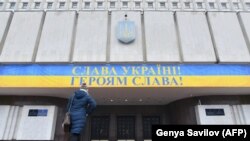On February 5, Ukraine’s President Petro Poroshenko said he would order the country’s border guards not to allow Russian election observers into Ukraine to monitor its presidential and parliamentary elections in 2019. Ukrainian Foreign Minister Pavlo Klimkin later explained why his country is so opposed to Russian participation in the election monitoring mission:
Ukraine faces an uncomfortable situation with its upcoming presidential election, set for March 31, and parliamentary elections, set for later this year. It is de facto at war with Russia, which annexed the Crimean peninsula in 2014 and controls part of Ukraine’s Donbas. On the other hand, two of the members of the Organization for Security and Cooperation in Europe's (OSCE) Office for Democratic Institutions and Human Rights (ODIHR) election monitoring mission are citizens of Russia, which raised suspicion among many Ukrainians due to Russia’s ongoing information campaign against Kyiv.
On February 7, the Verkhovna Rada, Ukraine’s parliament, passed a draft law banning Russian citizens from serving as election observers for presidential and parliamentary elections. This drew criticism from Russia.
Several days before the Rada approved the draft law, Russian State Duma Speaker Vyacheslav Volodin was quoted as saying that Ukraine’s decision to exclude Russian elections observers violated international law. In fact, it does not violate international law, which does not require countries have any election monitoring at all.
However, some non-Russians, including pro-Ukraine Westerners, criticized the ban on Russian observers. Peter Tejler, head of the ODIHR election monitoring mission, said the decision violated Ukraine’s commitments as an OSCE member state.
"Of course, we are aware that a relevant bill was proposed,” Ukraine’s UNIAN news agency quoted him as saying. “We are also quite aware of the position voiced by the Ukrainian authorities, and we have concerns because it does not comply with OSCE commitments as for participation of all OSCE participating countries in the observation mission.”
Michael Savkiv is the director of the Ukrainian Congress Committee of America, which he says has been sending election observers to Ukraine since 1991, when the country achieved full independence. Savkiv himself was in Ukraine as an election observer several times. He told VOA’s Russian service that he could understand Poroshenko’s suspicion toward Russia because of its record on democracy.
“From the generic aspect of freedom for all, it would be good to have as many observers as possible, but we also know there is a slight taint to that which the Russians may do and or say in Ukraine,” he said.
VOA also spoke to Orest Deychakiwsky, an American member of the OSCE’s election monitoring mission who has observed Ukrainian elections in the past. He disagreed with Poroshenko’s statement, pointing out that Russians would provide minority of observers (2 out of over 850, in fact), and that Russia was a threat in “other areas.”
Brian Bonner, editor of the Kyiv Post, wrote in an op-ed that “the damage of having Russian observers on the mission is far and away offset by the great value of the ODIHR election mission.” He also called demands that the OSCE be kicked out of Ukraine altogether should Russians be among its observers an “ignorant invitation to election fraud.”
The director of the OSCE’s ODIHR, Ingibjörg Sólrún Gísladóttir, said in a statement on February 7 that Ukraine’s decision to block representatives from a member state is “without precedent,” noting that observers with ODIHR do not represent their respective countries, but the OSCE as a whole. She also stressed that all observers must adhere to ODIHR’s observation methodologies and abide by a “strict code of conduct.”
On Friday, February 8, the Interfax Ukraine news agency quoted ODIHR spokesman Thomas Rymer as saying the two Russians would be excluded from the list of long-term observers. He also said that without the Russian observers, the long-term part of the election monitoring mission would include 90 observers.
The ODIHR methodology includes not only a core of about 12 team members, but also “several dozen” who arrive early and stay late, considering not only election day monitoring of polling stations but also taking into account “the pre-election, environment, looking out for violations such as administrative constraints and disregard for fundamental civil and political rights.”
Related fact checks: Russian State Media Proclaims the Elections in Donetsk ‘Democratic’ – Based on Unqualified Observers
Russian Media Cite Fake Election Observers






